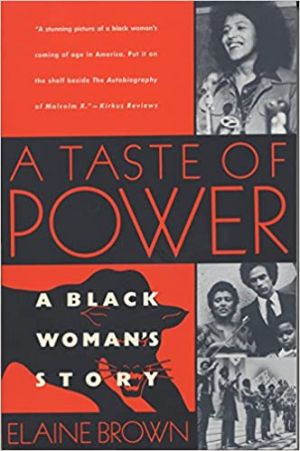A Taste of Power: A Black Woman's Story
A Taste of Power: A Black Woman's Story was firstly published on December 1st, 1992 by Anchor. The book was written by Elain Brown. The book explains how the journey of Elaine Brown, the chairwoman of the Black Panther Party, from a kid in an impoverished neighborhood in Philadelphia to become the chairwoman of the Black Panther party's hierarchy and then fleed from the Black Panther Party and her lover and founder of the Black Panther Party, Huey P. Newton[1].
Plot

Elaine Brown is raised fatherless in North Philadelphia. Her mother teaches her and prioritizes education as the main focus for Brown despite the poverty they have. With Brown's intellect, she goes to a private school where most of the students are white. Graduated from Philadelphia High school, she attends Temple University though she drops out to be a professional songwriter in Los Angeles. She works as a cocktail waitress at a strip club where she meets Jay Kennedy, a married white man. Kennedy has an affair with Brown and inspires her to be interested in politics and radical movement. Afterward, she breaks up with Kennedy and meets the Black Panthers party members, and finally, she joins the party in 1968 after the assassination of Martin Luther King Jr. She realizes what is meant to be black and woman throughout her involvement in the Black Panther Party. As the party faces struggle, Huey, the co-founder of the Black Panther Party, has a relationship with Brown. Later on, Huey has to be exiled from American to Cuba and he sets Elaine Brown as the chairwoman of the party. She establishes several programs that can empower black Americans from 1974 to 1977. Then, Huey comes back to America and becomes the chairman of the party. In the end, Elaine has a different point of view compared to Huey, and thus, she decides to leave the party and goes back to be with her mother raising her daughter[3].
Black Empowerment
The Black Panther Party is originally established to protect black Americans from police brutality. Within two years, they could assist black Americans in dozens of major cities such as New York, Los Angeles, Washington, D.C., Detroit, and Atlanta. Elaine Brown has always been involved in the black power movement. During her college life at the University of California Los Angeles, she is the first person representing the Black Student Alliance in California's Black Congress in 1968. While she is a member of the party, she helps Free Busing to Prisons program that assisting black prisoner's relatives could visit them within the prison. Not only that, when Brown becomes the chairwoman, she creates many black empowerment programs including the Panther Liberation School, Free Breakfast program, and political campaign. The free Breakfast program is set to serve many black Americans who can not afford breakfast with free food. She also successfully manages the campaign of Lionel Wilson, the first black mayor of Oakland. As for panther Liberation School is to provide many black Americans to have a good education and the awareness of being black[4].
Controversy
Brown writes that during her school life, she realizes that many people tend to look down on black Americans. Like when she goes to the private school, she is like only a few selected black Americans to study there. She also explains that the Black Panther Party during her leadership faces the most violent aggression by the police in America. She faces FBI threats as the party is deemed to be capable of bringing changes to America. The FBI and police target the party and have inflicted violence towards them[5].
References
- ↑ A Taste of Power: A Black Woman's Story. Goodreads. Retrieved January 30 2021
- ↑ A Taste of Power: A Black Woman's Story Book Cover. Amazon. Retrieved January 30 2021
- ↑ Malori Baker. A Taste of Power: A Black Woman's Story Prezi. Retrieved January 30 2021
- ↑ Angela Davis Summary SuperSummary. Retrieved January 30 2021
- ↑ DeNeen L. Brown. When a woman led the Black Panther Party The Washington Post. Retrieved January 30 2021